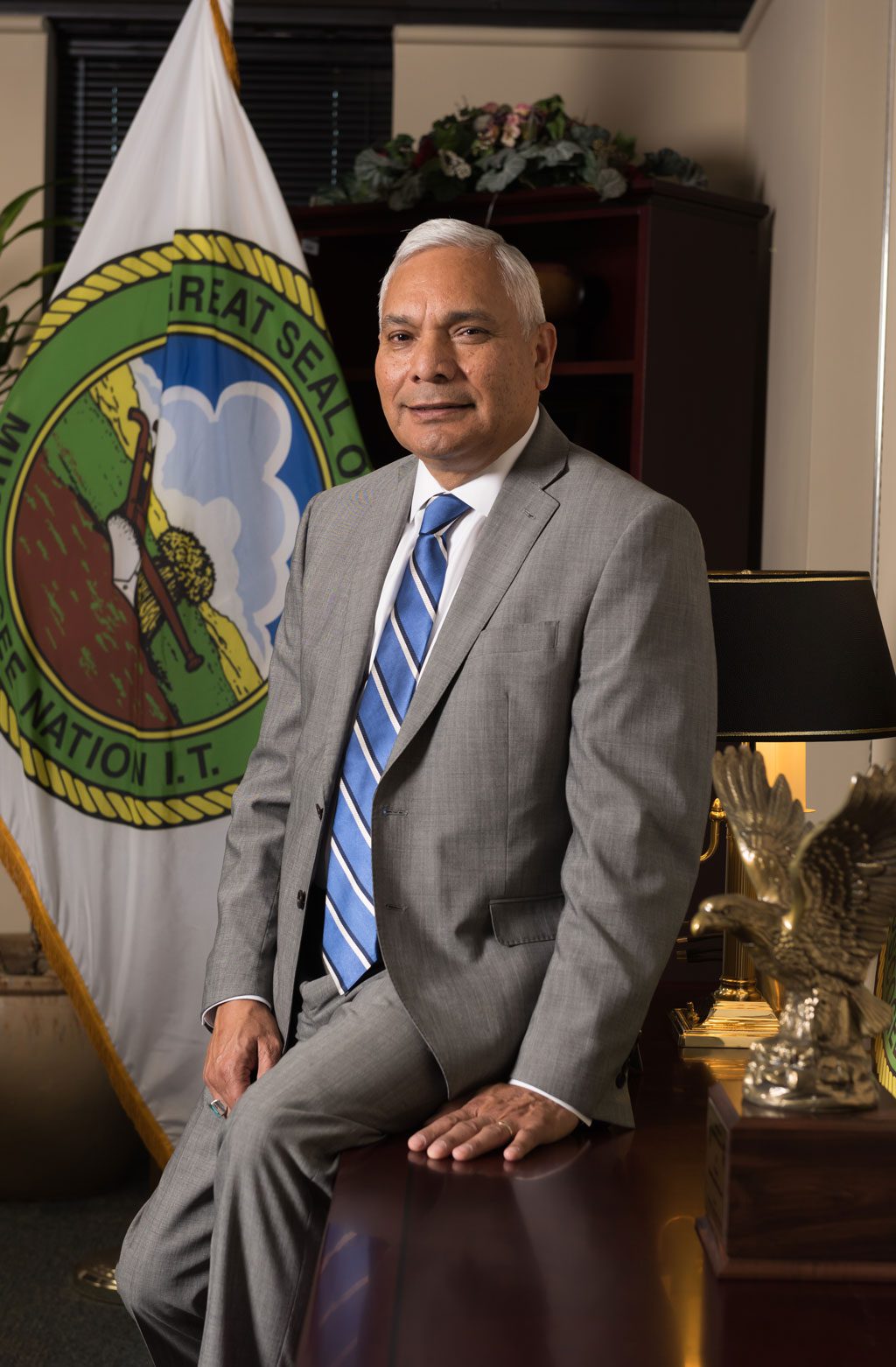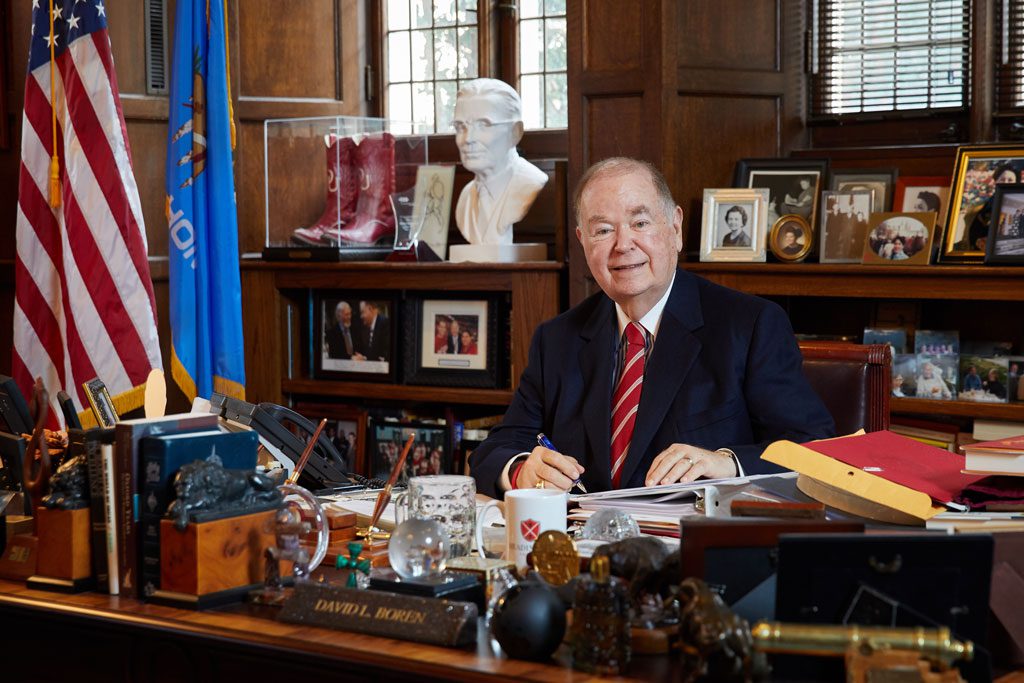A Confluence, Not a Contradiction
Muscogee (Creek) Nation Chief James Floyd says cultural values weave with tribal enterprises.
When James Floyd, principal chief of the Muscogee (Creek) Nation, discusses culture guiding business interests, the message cannot ring hollow … because he will hear about it.
The Nation, with scores of social-welfare agencies throughout Green Country, serves 84,000 members, and garners profits from casinos and resorts. For Floyd, those missions don’t contradict; instead, they mesh.

“You can’t hide anything,” Floyd says. “We want to be successful financially, but also maintain an identity unique to ourselves. Our values give us balance.”
He cites the River Spirit Casino Resort along the Arkansas River in south Tulsa; it became fully functional in 2017. Floyd discusses hotel amenities and Jimmy Buffet’s Margaritaville in the same breath as the tribe’s violent removal from homelands in the southeastern United States in the 1800s.
“River Spirit is the biggest investment we’ve had and the staff takes a lot of pride in presenting this as a place people want to come to,” Floyd says. “But the most important part for me is what this property represents. We want to make sure that patrons know our history, our people and our art. Here’s who we were and who we are now. The whole theme is in the structure.”
Tribal enterprises like River Spirit underwrite $6 million annually in human services.
“Health, education and welfare – the big three – are the focus of our national council,” Floyd says. “For instance, we have assistance programs for gas and electric bills, both summer and winter. There’s burial assistance, money for school clothes, scholarships, incentives for students to maintain at least a 3.0 GPA, funding for vocational training…. We help about 3,000 college students every semester, from UCLA to Harvard.”
Education is vital to the past … and future.
“When we were forced to Oklahoma, the first thing we did was set up schools and colleges,” Floyd says. “The council house in Okmulgee had a school in it in the 1880s.”
Floyd gets excited about young people earning collegiate degrees or vocational certifications because they remember their roots.
“We use our culture in our everyday life to guide our decisions,” he says. “We know our ancestry. We want to retain our language and our families. We’ve overcome obstacles and traumas the last 300 years by relying on our traditional beliefs.” – Brian Wilson
Web-Exclusive Q & A
OM: You’re halfway through your four-year term. How has that gone? There were some rough patches even before you became principal chief.
JF: In the first two years, we did a lot of work to achieve financial stability. We made some cuts and decreased expenses. We had to lay off 123 people, but we hired back half of them through retraining, and now we have 700 more employees overall. You have to have a stable foundation going forward. In that painful process, we learned we have to train and prepare people for other jobs.
OM: The land north of River Spirit Casino Resort and just south of Joe Creek was used for staging during construction of the Margaritaville expansion. All the portable buildings and equipment are gone. What will happen with that area?
JF: We will probably add retail outlets with an expansion of the smoke shop. We’re trying to have a theme that will match River Spirit, so we’re talking with many in the Tulsa Indian community. And we’ll still have some leftover space for parking.
OM: A bicycle-pedestrian trail already ran in front of River Spirit before the expansion. Why was it upgraded and rerouted to run right along the Arkansas River?
JF: That project fits with the Nation’s beliefs. We have that obligation to the Tulsa community. We could have kept the old trail in place, without a view of the river, but we want people to see the bald eagles, the hawks, the wildlife. Those are important to us and we encourage everyone to see them, too. We want people out in nature.
OM: Describe your business management style.
JF: We have choices, and I’m the biggest servant for 84,000 tribal members. We want our people to be employed and be trained, preferably with certifications, so that they can be leaders. We also want to maintain our heritage, so we invest and partner with companies that coincide with our values. For instance, we’re talking with two overseas companies from a country that also has indigenous people and understand their unique challenges. That’s important.
OM: Describe your leadership style.
JF: I try to be consistent and transparent and lead from the front so people can see me in the community. I want to hear what can be done to help the people. You give it your best. You have to be out there supporting people because it’s not for me. This was my first election ever because I’m not a politician. I’m just a normal person who wants to be approachable. I just happen to hold the position as principal chief and I work hard every day for the Nation’s citizens.
OM: You often talk about education, whether it’s providing scholarships and grants or seeing college or vocational training as a way to improve socioeconomics. Why?
JF: Education has always been important historically to the Nation, even when we lived in the southeastern United States. It’s always great to see students having success. We have 71 public school districts within the Nation’s boundaries and we give them thousands of dollars that help to buy team jerseys, school equipment and supplies.
OM: Besides the River Spirit expansion coming fully online, what other major accomplishments occurred in 2017 for the Muscogee (Creek) Nation?
JF: We’re on firm financial footing. That’s important. Also, we continued to expand medical services. For example, the hospital in Okemah replaced a 60-year-old facility.
OM: What can we expect in 2018 and beyond?
JF: We have a master plan for the Nation’s capital in Okmulgee that will guide decisions for the next 25 years by expanding our government buildings and properties. We know the types of services we can do ourselves and the services that we can buy. For instance, the health clinic in Eufaula that’s opening in June will replace a 40-year-old building. It will increase from 5,000 square feet to 70,000 square feet. We have other clinics that need to be updated, especially in Sapulpa and Okmulgee.
OM: What are the best parts of your job?
JF: It’s the best busy that you can ever be involved in because we have great people to serve. It’s hard work but fun.


























